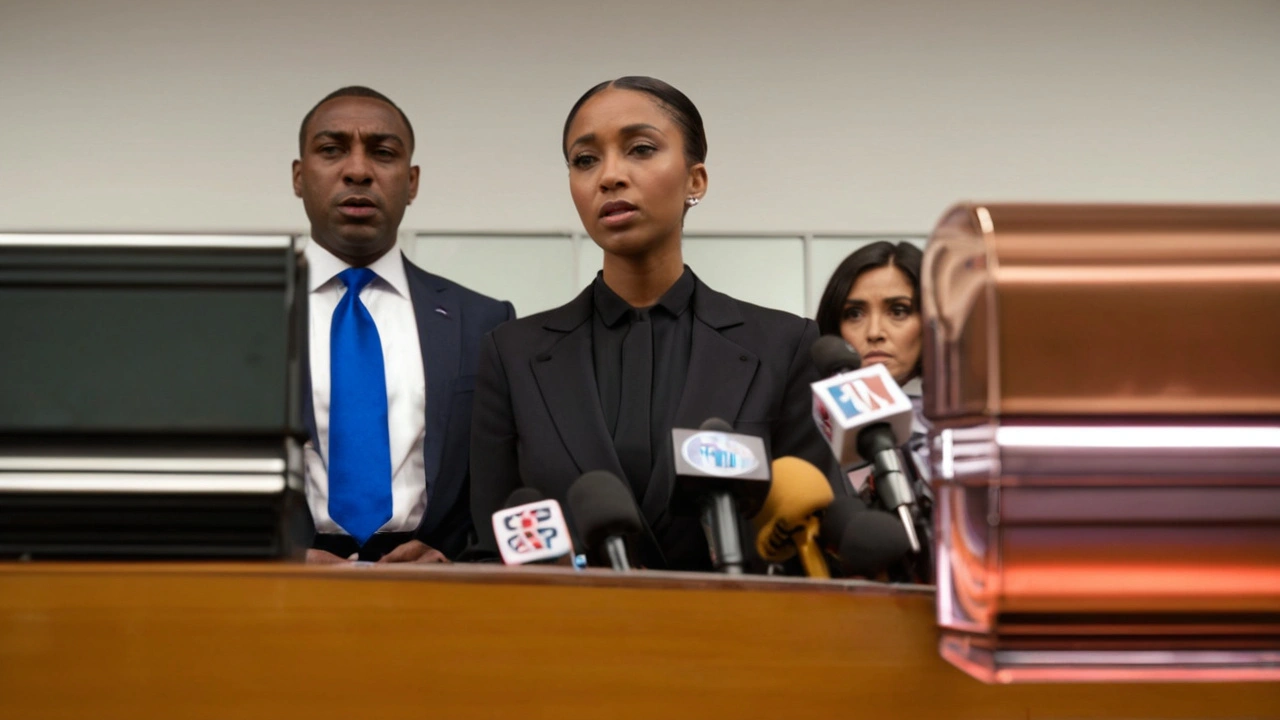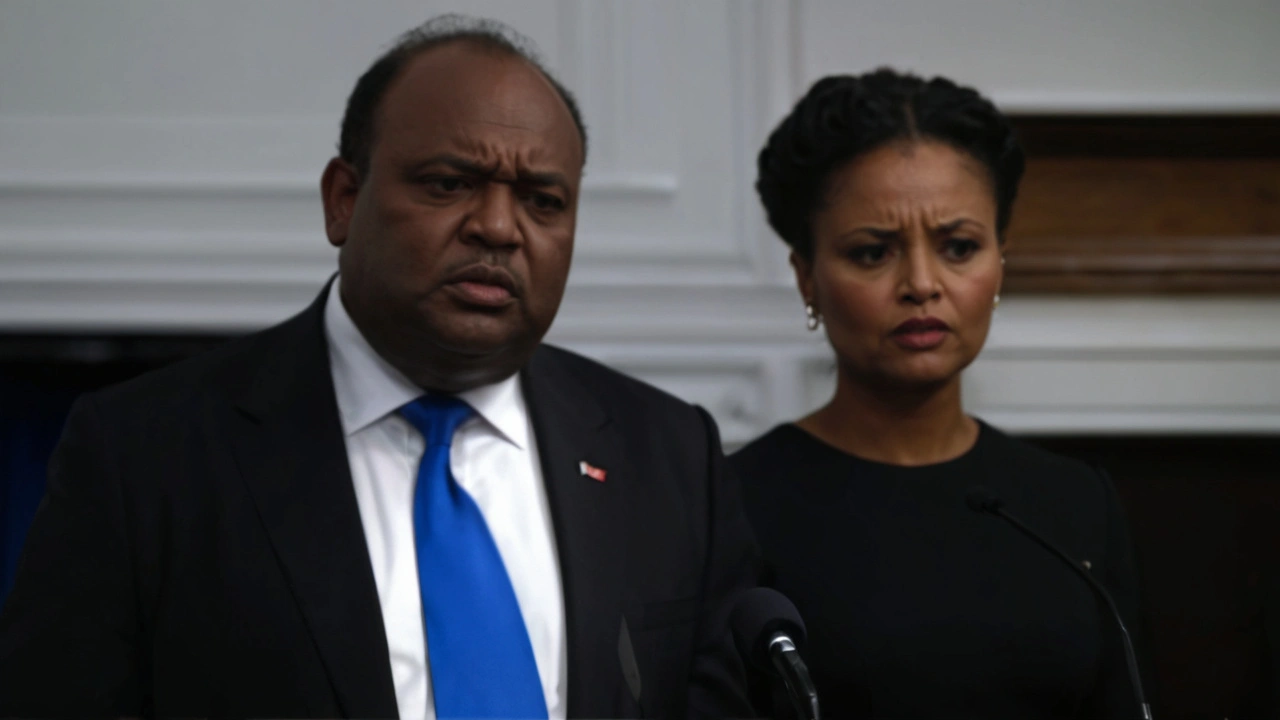The Fatal Shooting of Sonya Massey: A Call for Change
The serene town in Illinois where Sonya Massey lived turned into the epicenter of outrage and a renewed push for police reforms after a tragic incident unfolded. On that sorrowful day, Massey, a 36-year-old Black woman who had dialed 911 for help, became a victim of the very system she sought protection from. Her life was taken by Sangamon County Sheriff's Deputy Sean Grayson, and her death was caught on video, stirring emotions and demands for urgent action and justice.
Sonya Massey had made a routine call to 911 to report a suspected prowler. What followed was anything but routine and defied all logic. Deputy Grayson arrived on the scene and, in a sequence of events that is hard to fathom, asked Massey to show identification. The situation escalated quickly. As Massey proceeded to remove a pot of hot water from the stove, Grayson reacted violently. He shot her three times, tragically including once in the head.
What has added fuel to the fire of public outrage is the fact that this chilling incident was captured on video. The footage shows Grayson actively discouraging another deputy from using a medical kit to save Massey. This callous disregard for human life has evoked fury and grief among the public and civil rights activists.
Sean Grayson's career has come under intense scrutiny. In just four years, he had worked at six different law enforcement agencies, raising serious questions about his fitness for duty. Following the incident, he was promptly fired and faced multiple charges, including first-degree murder, aggravated battery with a firearm, and official misconduct. His not guilty plea has only intensified the public outcry for accountability and justice.

The National Outcry: Calls for Reform
The police shooting of Sonya Massey has transcended local boundaries, drawing national attention. Vice President Kamala Harris has taken a stand, invoking Massey's case to urge Congress to pass the long-stalled George Floyd Justice in Policing Act. This act, which has been stuck in legislative gridlock, aims to implement comprehensive police reforms, including better accountability measures and more transparent practices.
President Joe Biden has echoed these sentiments, expressing his outrage and calling for justice for Sonya Massey's family. He highlighted the necessity of systemic changes to prevent such tragic incidents from recurring. Civil rights groups have also rallied around Massey's case, demanding urgent reforms and reminding the nation of the pervasive issues of systemic racism and unwarranted police violence.
The incident underscores a broader struggle within the United States: the ongoing fight for meaningful police reform in the context of systemic racism. The deaths of George Floyd and Michael Brown, among others, serve as grim reminders of a deeply entrenched problem that requires immediate attention and action. Each of these cases demonstrates the urgent need for a policing system that serves and protects all citizens equally and humanely.

The Human Cost of Inaction
The tragic loss of Sonya Massey is more than a statistic; it's a stark reminder of the human cost of inaction. Her family and friends now face an unimaginable grief, seeking justice in a system that has consistently failed people of color. Their calls for justice are echoed by communities and activists nationwide who see Sonya Massey's case as yet another failure of an outdated and biased system.
The path forward is evident but fraught with challenges. Policymakers must prioritize the passage of the George Floyd Justice in Policing Act to bring about comprehensive changes in law enforcement practices. This includes enhanced accountability, the removal of bad actors from the police force, and the implementation of training programs aimed at de-escalation and non-lethal interventions.

Conclusion: The Imperative for Reform
The shooting of Sonya Massey is not an isolated event but part of a troubling pattern of violence against people of color by law enforcement. It illustrates the urgent need for systemic reforms to ensure that such tragedies do not continue to occur. The national attention and outcry triggered by Massey's death provide a pivotal moment for change. The time to act is now, and it's up to the nation's leaders to heed the calls for justice and reform.


Steve Dunkerley
July 25, 2024 AT 07:16I am deeply saddened by the loss of Sonya Massey, whose death underscores the systemic deficiencies in procedural justice within law enforcement. The video evidence provides an unequivocal case study of excessive force that contravenes established use‑of‑force protocols. Moreover, Deputy Grayson’s employment history, spanning six agencies in four years, raises serious concerns about vetting mechanisms and retention policies. The charges of first‑degree murder and official misconduct signal an essential, albeit delayed, accountability pathway. It is incumbent upon legislators to prioritize the George Floyd Justice in Policing Act to embed statutory oversight, transparent disciplinary records, and community‑mandated de‑escalation training. Only through rigorous policy reform can we mitigate recurrence of such tragic incidents.
Jasmine Hinds
July 25, 2024 AT 12:49We're all feeling the pain and we must keep the fire burning for change! 😊
Madison Neal
July 25, 2024 AT 21:09Sonya’s story hits home because it reflects a pattern that many communities have been living with for far too long. When a citizen reaches out for help and is met with lethal force, it signals a breakdown in the social contract that police are supposed to uphold. The fact that the deputy discouraged medics from assisting only deepens the moral outrage, highlighting an institutional culture resistant to accountability. Studies show that consistent de‑escalation training reduces fatal encounters by up to 30 percent, yet such programs remain sporadic. The federal push for the George Floyd Justice in Policing Act could standardize these training requirements nationwide. Additionally, establishing independent civilian review boards can provide the oversight that internal affairs often lack. We need to channel our grief into concrete legislative demands and community organizing. Solidarity across states can amplify the pressure on lawmakers to act swiftly.
John Crulz
July 26, 2024 AT 04:06I get why many people are flipping between anger and disbelief after watching the body‑cam footage. On one hand, the obvious violation of constitutional rights is crystal clear; on the other, the systemic inertia that allows this kind of behavior to persist is maddening. It’s not just about one bad officer, it’s about the policies that enable a culture of impunity. The fact that Grayson moved through six agencies in just four years suggests a failure of background‑check protocols and a lack of inter‑agency communication. Bringing his case to trial is a step forward, but it does not absolve the need for broader reform. What we need is a national standards framework that mandates transparent reporting of use‑of‑force incidents. Community‑led oversight panels could serve as a check on excessive force while fostering trust. Training that emphasizes trauma‑informed responses can help de‑escalate situations before they turn deadly. Moreover, funding for mental‑health services could reduce the number of calls that end in violent confrontations. While the President and Vice President are speaking out, policy change requires sustained pressure from the ground up. Grassroots coalitions should keep the conversation alive on social media, in town halls, and at state capitols. In short, we must turn our collective grief into actionable momentum.
Anita Drake
July 26, 2024 AT 08:16Across cultures the expectation that law‑enforcement serves and protects is universal, yet the tragic outcome in Sonya Massey’s case reveals a breach of that trust. Acknowledging the pain felt by her family and by Black communities nationwide is a vital first step toward healing. The current legislative push, if passed, would embed equitable accountability measures that resonate with diverse populations. Inclusive policy design should involve input from community organizers, scholars, and survivors of police violence. By centering lived experiences, the reforms can address the unique challenges faced by marginalized groups. Ultimately, systemic change thrives when every voice is heard and valued.
Eduardo Lopez
July 26, 2024 AT 19:23It is an unequivocal moral failure when a government‑sanctioned individual resorts to lethal violence against a citizen seeking protection. The incident involving Sonya Massey stands as a stark indictment of a policing paradigm that glorifies aggression over compassion. One cannot overlook the egregious negligence displayed when the deputy actively discouraged medical assistance; such conduct borders on willful cruelty. The pattern of repeated deployments of officers with questionable histories across multiple jurisdictions demonstrates a systemic breakdown in vetting processes. This is not a mere “bad apple” scenario, but a rotten orchard that must be uprooted in its entirety. The legislative inertia that stalls the George Floyd Justice in Policing Act is nothing short of a betrayal of the public’s demand for accountability. To pretend that incremental, half‑hearted reforms will suffice is to indulge in a comforting illusion that postpones necessary transformation. Real justice demands the establishment of an independent federal oversight commission with binding authority to investigate and sanction misconduct. Moreover, mandatory, evidence‑based de‑escalation curricula should be standardized, and officers who repeatedly fail these standards must be removed without severance. Communities deserve transparency; thus, all use‑of‑force incidents must be publicly released within 48 hours. The media’s role in amplifying stories like Sonya’s is vital, yet it cannot substitute for concrete policy action. Citizens must remain vigilant, organized, and unrelenting in their advocacy. Civic engagement, in the form of town‑hall meetings, organized petitions, and strategic voting, will create the political pressure necessary for genuine change. If we allow this tragedy to slip into the annals of forgotten injustices, we concede defeat to the very forces that threaten our democratic ideals. Therefore, let us collectively demand that every legislative seat be held accountable for advancing these sweeping reforms, lest we repeat history’s dark chapters.